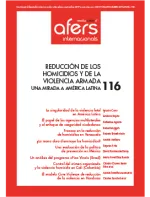Homicide reduction in Minas Gerais: an analysis of the “Fica Vivo!” programme

This article presents the results of qualitative research into the “Fica Vivo!” programme’s contribution to the control and reduction of homicides in Minas Gerais (Brazil) in the views of the social and institutional actors involved. The methodology is based on semi-structured interviews and focus groups held with the leaders and monitors of the workshops, and with community leaders and professionals from the public security and penal justice sectors. In these conversations a number of tensions emerged that relate to the social functions of the programme’s actors – the technical team and the public security professionals. Among the disputed issues, particularly noticeable were the perceptions of the programme’s goals and the flow of information between the community and the team in a dynamic that does not always include the Police.
Key words: Brazil, “Fica Vivo!”, prevention programmes, homicides, community
Cláudio Chaves Beato Filho. Profesor titular de Sociología y coordinador del Centro de Estudios de Criminalidad y Seguridad Pública (CRISP), Universidad Federal de Minas Gerais (UFMG)
Ludmila Mendonça Lopes Ribeiro. Profesora adjunta de Sociología (UFMG) e investigadora del CRISP
Valéria Cristina de Oliveira. Becaria posdoctoral del Centro de Estudios de la Metrópoli (CEM) de São Paulo, Fundación de Apoyo a la Investigación del Estado de São Paulo (FAPESP)-Proceso 2016/15899-7
Sara Carla Faria Prado. Becaria de la Fundación João Pinheiro
DOI: doi.org/10.24241/rcai.2017.116.2.129
>> The full text articles of this issue are available only in Spanish language